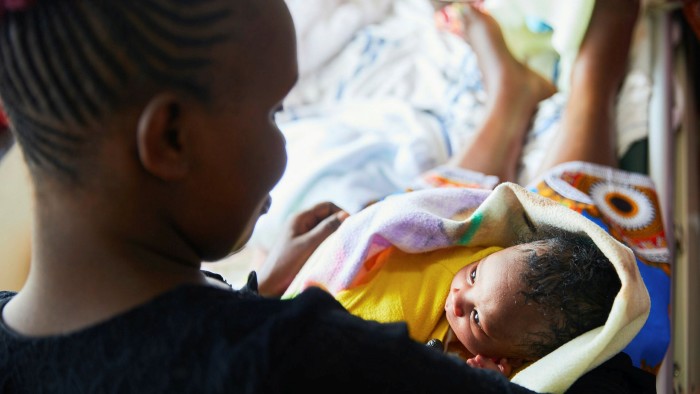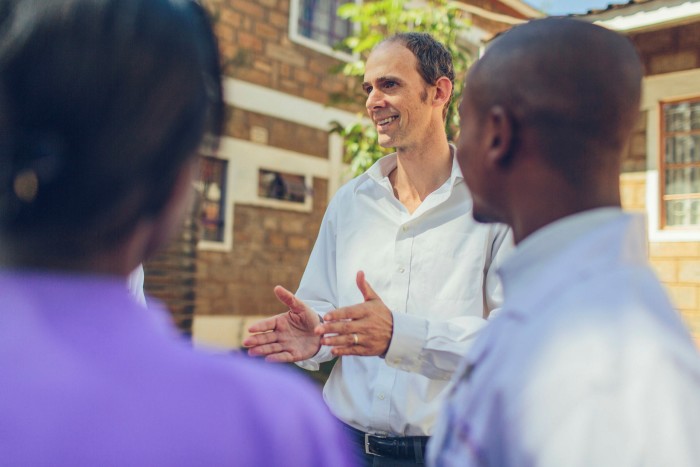Kenyan mothers-to-be get the healthcare message

Roula Khalaf, Editor of the FT, selects her favourite stories in this weekly newsletter.
Which foods are dangerous to eat while pregnant? Why isn’t my baby moving? How often should I exercise? Expectant mothers have many questions, but obtaining accurate information can be problematic in countries that lack reliable healthcare.
In Kenya — which has the world’s 15th-highest maternal mortality rate — 1m women have registered to exchange pregnancy-related questions with a team of health advisers via a free, artificial intelligence-powered SMS service called Prompts. Run by Jacaranda Health, a non-profit healthcare group, Prompts uses AI to triage messages and ensure that “danger signs”, including bleeding and loss of baby movement, receive the fastest responses, such as advice to seek emergency care.
The group uses SMS, rather then internet-based communications, “because it has broad accessibility” in Kenya, says Nick Pearson, Jacaranda co-founder. “Tech-heavy solutions look good, but once they are embedded they might not work so well. While a lot of people have phones with data capability in Kenya, they don’t purchase data so often.”
Pearson established Jacaranda, which is funded by philanthropic donors and aid agencies, in 2010, initially as a provider of subsidised maternity hospitals in Nairobi, Kenya’s capital, before setting up Prompts eight years later.
Expectant mothers can register for Prompts in English or Swahili at hundreds of health centres across 20 of Kenya’s 47 counties, primarily in the more populous south-west. Jacaranda’s help desk receives 3,000 inquiries a day and aims to respond to all messages within 24 hours, while “clinically urgent” queries are addressed within an hour.

Each incoming message is triaged by an AI system according to keywords such as “bleeding” or “headache”. Critical messages are flagged to a senior help desk clinician for an urgent response or phone call. For less pressing queries, the AI prepares a canned response that is vetted by the help desk before it is sent.
“The level of confidence in the AI getting the answer right is around 95 per cent [for critical danger signs], but when it’s potentially life-threatening we don’t want to take that chance,” Pearson says. “That’s why we keep the human between the patient and the AI. It’s still a human-first system. The AI is serving up a potential canned response. The human agent then checks that it matches the real intent of the question.”
Pearson, a former consultant at social investment fund Acumen, wants Jacaranda to become an integral feature of how Kenyans seek medical care and notes that 85 per cent of women who are flagged with “danger signs” in pregnancy follow the clinicians’ advice to attend a hospital.
For new mum Grace Kimenju, 34, who lives near Nairobi, Prompts helped her with a scare at seven months’ pregnant when her baby stopped moving. Rather than scan the internet in a panic for answers, she sent an SMS to Jacaranda. Within minutes, it had urged her to go to hospital immediately. The scare was a false alarm, and last year she gave birth to her baby girl, Angeline.
“If I hadn’t interacted with the message, maybe something bad would have happened,” says Kimenju, an economic researcher. “The messages pushed me to go and seek care. Before using Jacaranda, I was getting information from the internet or by talking to friends and family. But I think the messages have verified information — it’s a reliable source. I know I can ask anything.”
Jacaranda is almost entirely funded by philanthropic groups such as the Bill & Melinda Gates Foundation and the Pfizer Foundation, as well as the US Agency for International Development. This year, Jacaranda expects to receive $6.5m from such donors, up from $714,000 in 2018. The organisation aims to reach 1.5m women through Prompts by the end of 2022 and have an active userbase of 800,000.
Alongside Prompts, Jacaranda provides mentoring for state midwives in ante- and postnatal care at 270 health facilities in Kenya. “The two programmes run in parallel to address the two biggest drivers of maternal death — gaps in care and people not accessing care early enough,” says Pearson.
However, he admits that making Jacaranda self-sustaining and cutting its reliance on philanthropists remains difficult. “We’re exploring funding from local governments, but there is no silver bullet,” Pearson says. “One of the challenges with digital health is there is no precedent for incorporating it into the healthcare system.”

Comments